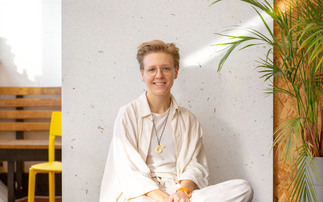Consultancy giant's head of corporate sustainability James Robey explains how the firm plans to tackle 'the biggest business change problem we've ever seen'
As an organisation that specialises in helping businesses transform, the coming decade should hold no shortage of opportunities for French management consulting giant Capgemini.
After all, the world's leading climate scientists made clear in the IPCC's landmark 2018 report that the next 10 years will be critical in deciding whether or not the planet stands a chance of limiting average global warming to a manageable - albeit far from ideal - level by the end of the 21st century, placing huge impetus on governments and businesses to massively up their ambition in driving towards net zero as quickly as possible.
And that is precisely where Capgemini's expertise comes in, explains James Robey, the firm's head of corporate sustainability.
"Sustainability is a business change problem," he tells BusinessGreen. "Arguably it's the biggest business change problem we've ever seen. Over the next decade virtually every business on the planet is going to have to radically reconsider their business models if we are going to get to an outcome aligned with 1.5 degree climate science."
Over the next ten years, carbon reduction efforts will be a central element of Capgemini's work with its clients, which include some of the world's largest automotive, telecommunications, consumer goods and retail companies. The firm's new sustainability strategy, unveiled last month, includes a pledge to help its clients save 10 million tonnes of carbon between now and 2030 - a figure 20 times bigger than its own operational footprint.
"We are a business about helping our clients transform," Robey muses. "There is therefore a strong alignment with what we are doing with our clients every day and helping our clients through their journey through sustainability," he says.
Besides, Capgemini has a good track record when it comes to designing and delivering on sustainability programmes. In January this year, before the coronavirus took a huge bite out of corporate travel and energy consumption, the French-headquartered firm sailed past its previous target to achieve a 30 per cent carbon reduction per employee against a 2015 deadline, ten years ahead of its 2030 deadline.
The firm has now refreshed and rebooted its vision, pledging to achieve carbon neutrality within its own operations by 2025 utilising "high quality offsets" such as reforestation, before delivering net zero carbon emissions across its full supply chain by 2030. The company's carbon reduction programme, which is currently being validated, is now aligned with a 1.5 degree warming scenario - it had previously been set against 2C - and involves the company ditching the use of fossil-fuel generated power altogether by 2025.
"Having made strong progress against the 2C target, now was the time to set them against a more ambitious baseline, rather than to keep overachieving what we previously set," Robey says. The new targets are also more ambitious in scope than the previous generation, given that they include Scope 3 emissions incurred by business travel, commuting, water, waste, and parts of the supply chain, he adds.
A more detailed break down of the supply chain emissions set to be included in Capgemini's pledge is due to follow in September, Robey emphasises the firm will be "reviewing the whole supply base of everything we buy and setting carbon reduction targets against those suppliers".
To achieve its new goals, the company will be taking steps to encourage staff members to curb business travel where possible and adopt greener forms of commuting once lockdowns lift and offices fill up again. The company has plans to roll out a hybrid and electric car fleet over the decades to come.
Robey stresses that Capgemini's focus on travel emission reductions and virtual collaboration long precedes the coronavirus crisis. Between 2015 and the end of 2019, the firm reduced its travel emissions per employee by 22 per cent.
But he concedes that while virtual collaboration has been at the heart of Capgemini's sustainability mission for many years now, the pandemic been a "game changer" in terms of catalysing its acceptance.
"While 100 per cent remote delivery is not going to be the correct answer forever, coming out of Covid-19 we will be looking to find a new equilibrium which is much more agile and flexible to delivery, with a significant lower dependency on always relying on travel to have face-to-face meetings," Robey says. The firm intends to share some more resources over the months on the best strategies for virtual meetings and workshops.
Capgemini's sustainability team, which is spread across multiple countries, is proof of the success of virtual collaboration. "The philosophy is, we build the team on where the best people are," Robey says. "I have a number of people working with me from the UK, but I also have people working for me from the Netherlands and from India. Then, we have country teams in all our large countries." In order to deliver a "consistent and agile" approach to sustainability across all 50 countries Capgemini works in, the strategy is set in the centre and then "flowed down" in discussion with key countries using ISO's 14001 environmental management system.
India, which is home to more than half of Capgemini's employees, is responsible for roughly 44 per cent of the group's emissions. In order to bypass what he describes as a "more challenging" renewables market, Capgemini has installed 5GW of solar power across its campuses, with its Bangalore office the first corporate campus in the country to receive net zero platinum certification from the Indian Green Building Council. The plan is to continue to drive reductions in staff travel and to purchase renewable energy over the months to come in order to meet the firm's more stretching targets.
And with an increasing number of firms coming under fire for the disconnect between their ambitious sustainability goals and the emissions produced by their clients - Microsoft, for example, has pledged to achieve 'negative emissions', but it continues to provide AI technology and services for oil and gas firms - will Capgemini's new sustainability commitments impact the type of clients it takes on? Robey is tight-lipped on details, but reveals the issue is on the firm's radar. "It's a question that is now being discussed, whereas in the past it would never have been discussed," he says. "We are not at the stage where I can give you a 'yes' or 'no' answer, but it's certainly a topic that is now on the agenda."
Still, the firm is aware that its clients in oil and gas, automotive and fast moving consumer goods have carbon footprints several magnitudes larger than its own, which is why its new strategy for the first time includes goals to curb its clients' envrionmental impact. "Our own carbon footprint last year, excluding commuting, was around 470,000 tonnes - almost half a million tonnes," Robey explains. "You can start to see that some of those industries have carbon footprints in the tens, if not hundreds of millions of tonnes of carbon. Therefore we are keen to recognise that the sorts of services we are supplying to those clients have the ability to be delivering carbon savings."
Overall, however, Robey is buoyed by a growing recognition within Capgemini - as well as across its clients and the wider private sector - that sustainability is a core business priority. "My major reflection over the last decade or so is that the conversations have become easier in terms of the justification for sustainability," he says. In the past, green initiatives had to be backed by a watertight business case or accompanied by an argument for their social or reputational merits, but the last 18 months have seen a much needed, seismic shift, he explains.
There may still be a long road ahead on the journey to net zero, of course, but at least business and sustainability are now broadly - and rightly - viewed as two sides of the same coin.
"Sustainability is very much at the forefront of the chief executive and chief experience officer's agenda," Robey reflects. "We are less worried about the detailed business case, because actually we recognise that there is no business case for not being sustainable."
The Net Zero Leadership Hub is brought to you in partnership with BT, as part of its support for the Net Zero Leadership Stream at the world's first Net Zero Festival this autumn. All the content on the Hub is fully editorially independent unless otherwise stated.
You can find out more about the Net Zero Festival and reserve your place here.









